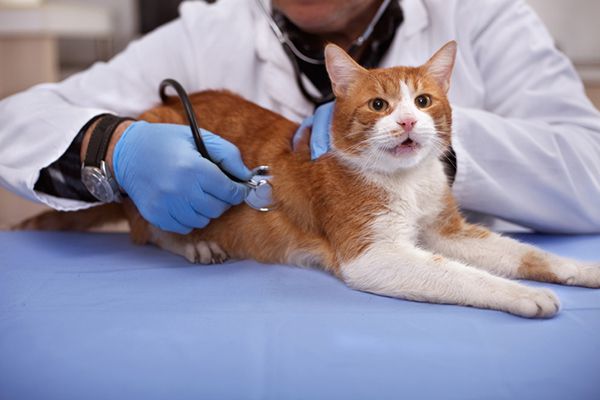
Just like us, our cats can get serious health problems. One of the things that can go wrong is that your cat can develop kidney problems. You should know the signs, watch out for causes, know what to do and learn how to prevent kidney problems from happening.
This article will let you know some of the different kidney problems cats can develop and what the next steps are.
Table of Contents
What Are Kidney Problems?
Kidney problems in cats are anything related to the cat’s kidneys not functioning properly. Like humans, cats need their kidneys to have good health and to survive. Cats can get the same types of problems with their kidneys as us humans do. They can have chronic kidney failure and can get diabetes which is a kidney related disease.
When the kidneys start malfunctioning, they leave integral tasks incomplete. Their job is to filter out waste from the digestive system and have the waste exit the body through urine. Kidneys with problems don’t do this properly and instead have the waste exit into the bloodstream.
Types of Kidney Problems in Cats
Some kidney problems that cats can develop are:
- Chronic kidney disease
- Renal kidney failure
- Polycystic kidney disease
- Kidney stones
- Kidney Toxicity
- Kidney cancer
- Diabetes
Chronic Kidney Disease
Chronic kidney disease is a slow loss of kidney function. Over time, the kidneys just stop working properly. Out of all kidney problems in cats, chronic kidney disease is the most common. A chronic disease has no cure, but following your vet’s advice and treatment will give your cat the longest and best quality of life as possible.
Kidney Failure
Renal kidney failure (or acute renal failure) is a rapid, sudden decline of health in the kidneys. The failure will happen within days to weeks. Causes of this are most likely toxins, an injury to the pelvis or an infection. Other causes are related to other medical conditions such as blood blockages, heart failure or an infection in the kidneys.
Polycystic Kidney Disease
Polycystic kidney disease is a hereditary disease that makes your cat develop cysts in their kidneys. These cysts grow over time and will affect your cat’s kidneys depending on the rate of growth which varies by the cat. This condition is mainly in Persian cats and can be detected through blood tests, urine tests, and ultrasounds. Read here to find the best foods for persian cats

Kidney Stones
Kidney stones are mineral buildups in your cat’s body. The minerals come together to form stones that cause blockages within the urinary system. This happens when the cat gets too much of a certain mineral. The urinary system is designed to exit poisonous waste from the body, if it blocked, then the waste gets trapped and will cause damage. Complete blockages can be fatal. A big sign of this is blood in the urine. If your cat is urinating blood, get them to the vet immediately.
Kidney Toxicity
Kidney toxicity is when medications prescribed to your cat for other medical conditions cause the kidneys to be overrun and eventually fail. When this happens, it can cause renal kidney failure as described above. It is a side-effect of these medications.
Kidney Cancer
Kidney cancer is cancer developing tumors in the kidneys. Renal cancer is aggressive. The tumors are invasive and spread quickly. Normally, if there’s cancer in the kidneys, it was spread there from somewhere else. Cancer needs immediate treatment.
Diabetes
Diabetes happens when your cat stops producing enough insulin to regulate their blood sugar. Diabetes can lead to more serious medical conditions. Some conditions include weight loss, dehydration, depression, comas, death and kidney failure. Keeping up with diabetes treatment is key to keeping the condition from developing kidney failure.
Common Symptoms of Kidney Problems in Cats
Cats are aloof creatures and will hide if something isn’t quite right. Since they can’t talk to you, you need to look for noticeable signs. If your cat is lethargic with no appetite, is losing weight or has excessive urination or thirst, you may want to take note and bring it up to a vet. Other symptoms include vomiting, abdominal bloat or bloody urine. If your cat has blood in its urine at any time, contact your vet immediately.
What Causes Kidney Problems?
A number of things can cause kidney problems. An unhealthy diet can lead to kidney failure. Medications and infection can be causes. Or it can be hereditary.
Another cause of kidney problems is being exposed to toxins. You should always be mindful of keeping anything with chemicals away from your cats, especially antifreeze. Toxins and chemicals can either be fatal to cats within a short amount of time. Or, they will cause disease and health problems that make them suffer over a prolonged period. Always triple check that your chemicals are away from your cats.
Other Medical Conditions that Cause Kidney Problems
Pre-existing conditions can affect a cat’s kidneys. Diabetes can lead to kidney failure. High blood pressure puts a strain on the kidneys. An infection can spread. Cancer can overtake the kidneys. If your cat has a medical condition, see if it can potentially lead to kidney problems so you can be aware and take steps to prevent it.
Medications That Can Cause Kidney Problems
Some medications can interact with kidneys and cause problems. Any drugs that are nonsteroidal anti-inflammatory drugs or nephrotoxic drugs can cause kidney problems. When putting your cat on medications ask your vet about potential side-effects and how severe these side effects can be.
What Should You Do about it?
If you see any of the above symptoms, contact your vet immediately then follow their advice. Your cat may need to get tests done to determine the appropriate course of treatment. If your cat has gotten into chemicals, call the pet poison helpline at 855-213-6680, and if instructed, you should go to your closest vet emergency hospital.
How Are Kidney Problems Diagnosed?

Some common tests used to diagnose kidney problems are blood and urine tests. Other tests the vets may use include x-rays, ultrasounds or biopsies.
Blood and urine tests are noninvasive procedures that you may have done already to check your cat for other problems. Blood and urine test determine if waste and toxins are not in the wrong places. If the kidneys are doing their job, then there should be no toxins in the blood and there should be waste in the urine.
Other tests like x-rays and ultrasounds are also noninvasive, but more stressful. X-rays have them placed alone with weird machines. Ultrasounds get close and personal with their bellies. Biopsies are invasive as they use anesthesia on the cat and then extract tissue from them. Biopsies are used to examine the tissue under a microscope. This method is done if the other tests don’t show sufficient results.
Common Treatments for Kidney Problems
Depending on the type of kidney problem your vet will walk you through what needs to be done. Some common treatments are:
- Surgery
- New diet
- Kidney transplant
- Medications
Surgery may be needed to remove blockages or tumors. Medications might be required and they may go along with a special diet. Your vet may put your cat on a low salt, a low protein or a low phosphorus diet depending on the issue.
Preventing Kidney Problems
Prevention efforts are key if you want to give your cat the best chance of not developing kidney problems. You should always take your cat to get regular checkups. Always seek a vet if your cat is showing any of the symptoms above. Looking out for symptoms allow you to catch medical conditions early before they develop into something worse.
Weight control is a big factor in prevention. Obesity causes health problems. You want your cat to be a healthy weight. Your vet will let you know if your cat is getting too big. With their advice, you can slowly decrease their food servings and incorporate more exercise into their routines.
Ask to avoid anti-inflammatory drugs and nephrotoxic antibiotics, and if you must, use them only use as directed by the veterinarian.
Always take advice from your vet, follow their diet advice and take them to their appointments. Treat other health conditions as best as you can to avoid them turning into kidney problems. Make sure you know the signs and symptoms to catch anything as early as possible.
Continue reading:
Best Cat Food for Urinary Health
Earthborn Holistic Primitive Feline Grain-Free Natural Dry Cat & Kitten Food Review


